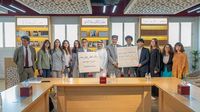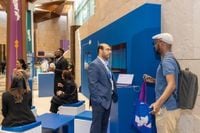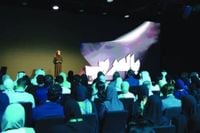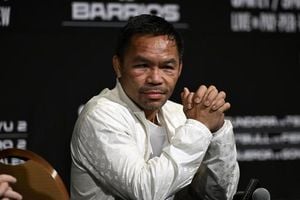On April 19, 2025, the Academy of the Arabic Language (ALA) celebrated a significant milestone by graduating a group of Italian students who have dedicated their studies to mastering Arabic. This event, held in Sharjah, is part of the Academy's global outreach initiative aimed at promoting the Arabic language worldwide and reinforcing Sharjah's status as a central hub of Arab culture.
The graduation ceremony was attended by prominent figures, including Dr. Mohamed Safi Mosteghanemi, Secretary-General of the Academy; Khalid bin Butti Al Hajri, Director-General of University City; and Dr. Wael Farouk, Director of the Arab Cultural Institute in Milan. During the event, gifts were distributed to the graduates, celebrating their achievements and commitment to learning.
In his speech, Dr. Mosteghanemi emphasized the transformative power of reading and the importance of linguistic immersion for mastering Arabic. He encouraged the students to view books as lifelong companions and to engage deeply with the Arabic language through its rich literature. “Reading is not just a skill; it’s a bridge to understanding our culture,” he stated.
Khalid bin Butti Al Hajri also acknowledged the unique role of the students in Sharjah, noting that their efforts contribute significantly to broader cultural exchanges. He praised their perseverance and highlighted the supportive cultural environment that Sharjah fosters for language learners.
Prior to the graduation ceremony, Dr. Wael Farouk delivered a lecture focusing on innovative approaches to teaching Arabic. He critiqued traditional methods that heavily rely on grammar and translation, advocating instead for a curriculum that teaches Arabic within its own linguistic and cultural framework. Farouk introduced a new five-part curriculum titled "The Living Word" (Le parole in azione), developed in collaboration with Dr. Alicia Ferrero. This curriculum is designed to guide learners from beginner to advanced levels and includes comprehensive sections on grammar and media language.
The method emphasizes practice, listening, and contextual understanding, aiming to develop natural fluency in the Arabic language. “To truly learn a language, one must live it,” Farouk remarked, highlighting the need for immersive experiences in language education.
The event concluded with a recognition of Sharjah’s cultural leadership in promoting Arabic language education globally and a call for continued cooperation among educational institutions to enhance Arabic learning.
Simultaneously, on the same day, the inaugural BilAraby Summit kicked off in Doha, Qatar, an initiative led by Qatar Foundation to re-establish the Arabic language as a driving force for innovation and creativity in the modern age. The summit showcased a session focused on 'Fanar,' an artificial intelligence (AI) platform developed by the Qatar Computing Research Institute (QCRI). This platform aims to protect and revive the Arabic language in the digital age.
Dr. Mohamed Eltabakh, Principal Scientist at QCRI, explained that the idea for Fanar arose from the growing concerns about the bias in existing AI language models, which tend to favor English over Arabic. “Studies have shown that these language models reflect Western cultures while excluding Arab and Islamic culture,” he noted, emphasizing the need for AI tools that understand and embody the Arabic context.
Dr. Eltabakh highlighted the alarming statistics regarding digital content, stating that while English content constitutes approximately 50 percent of the total global digital content, Arabic content accounts for less than 0.5 percent. “This disparity leads to a clear bias towards Western culture,” he added. One of Fanar's primary goals is to provide high-quality Arabic content that enhances the status of the Arabic language in the digital landscape.
He further asserted that ownership of technology equates to ownership of freedom of expression. “The Fanar project is not merely a linguistic initiative; it is a comprehensive vision for an independent Arab digital future that reflects our culture and protects our language,” Dr. Eltabakh concluded.
The BilAraby Summit, attended by over 500 participants from the Middle East, North Africa, and beyond, aims to promote Arabic in both creative and scientific fields. The opening ceremony featured a diverse lineup of talks and performances, including a musical performance by renowned artist Lotfi Bouchnak, who set the tone for the summit with a celebration of Arab identity.
Hisham Nourin, Executive Director of Strategic Initiatives and Programmes at Qatar Foundation, remarked, “BilAraby is more than a summit; it is a strategic expression of our belief that Arabic is not a language of the past but of the future.” He stressed the importance of creating resources and platforms that facilitate the use of Arabic in daily life, especially in the digital realm.
The summit also announced the winner of the BilAraby logo design competition, which attracted over 1,500 submissions. The winning design, created by Robin Khalil, draws inspiration from traditional Kufi script while incorporating a modern twist, symbolizing unity and stability in the Arabic-speaking community.
As the BilAraby Summit continues, it promises a rich array of sessions, performances, and discussions, including interactive labs and showcases that reflect the initiative's mission to empower Arab innovators and promote the Arabic language as a vital part of global discourse.






